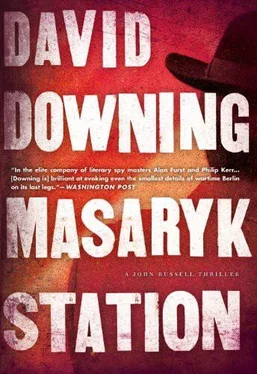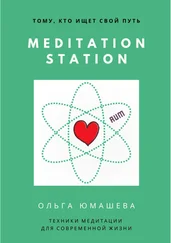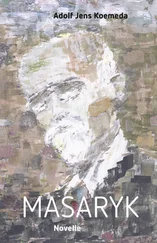David Downing - Masaryk Station
Здесь есть возможность читать онлайн «David Downing - Masaryk Station» весь текст электронной книги совершенно бесплатно (целиком полную версию без сокращений). В некоторых случаях можно слушать аудио, скачать через торрент в формате fb2 и присутствует краткое содержание. Год выпуска: 2013, ISBN: 2013, Издательство: Soho Press, Жанр: Шпионский детектив, на английском языке. Описание произведения, (предисловие) а так же отзывы посетителей доступны на портале библиотеки ЛибКат.
- Название:Masaryk Station
- Автор:
- Издательство:Soho Press
- Жанр:
- Год:2013
- ISBN:9781616952228
- Рейтинг книги:4 / 5. Голосов: 1
-
Избранное:Добавить в избранное
- Отзывы:
-
Ваша оценка:
- 80
- 1
- 2
- 3
- 4
- 5
Masaryk Station: краткое содержание, описание и аннотация
Предлагаем к чтению аннотацию, описание, краткое содержание или предисловие (зависит от того, что написал сам автор книги «Masaryk Station»). Если вы не нашли необходимую информацию о книге — напишите в комментариях, мы постараемся отыскать её.
Masaryk Station — читать онлайн бесплатно полную книгу (весь текст) целиком
Ниже представлен текст книги, разбитый по страницам. Система сохранения места последней прочитанной страницы, позволяет с удобством читать онлайн бесплатно книгу «Masaryk Station», без необходимости каждый раз заново искать на чём Вы остановились. Поставьте закладку, и сможете в любой момент перейти на страницу, на которой закончили чтение.
Интервал:
Закладка:
He drove on, half-blinded by the setting sun, crossing the Ringbahn by Halensee Station, and following the winding Konigs Allee to the Grunewald’s eastern perimeter. Private vehicles weren’t permitted beyond the lightless Hundekehle Restaurant, but Russell drove on down the access road. There seemed little chance of their being challenged at this hour, and he had reasons of his own for not wanting too long a walk after he had dug up the film.
They only passed one couple, who gave them a dirty look but kept on walking. The twosome had taken them for warmer bruder , Russell thought, men who were out for an illegal fuck in the forest.
A minute or so later he brought the car to a halt. As far as he could tell in the fading light, they’d reached the nearest point on the road to where he’d buried the film.
They both got out.
‘How far is it?’ the Russian asked.
‘A few minutes. No more.’
They started walking, Russell showing the way. Under the eaves it was darker still, but he found the clearing without any problem. ‘It’s over here,’ he said, walking towards the tree.
‘Where?’
‘Here,’ Russell told him, sinking to his knees. This was the moment he feared, when the Russian might order him aside and do the digging himself.
He didn’t.
Russell took his time scooping out the still-loose earth with his hands, and just as his questing fingers made contact with metal, the Russian leaned over his shoulder to see what was happening.
‘You’re in my light,’ Russell told him.
‘Well, hurry up,’ the Russian said, stepping back a pace.
Uttering a short and very silent prayer that internment hadn’t disabled the gun, Russell curved his hand around the grip, inserted one finger ahead of the trigger, and jerking it free of its temporary grave, opened fire at point-blank range.
The crack echoed through the forest, scattering loudly cawing birds up into the night sky.
The Russian was still moving, whimpering softly. The eyes looking up at Russell were those of a small boy.
He raised the gun, steeled his heart, and fired again.
When the door closed behind Russell and his escort, Effi’s first impulse was to have a good weep. But Rosa had beaten her to it-Effi’s daughter was sobbing in eerie silence, the way her real mother had taught her, when they lived in a Christian friend’s garden shed, and the Gestapo’s main hobby was seeking out hidden Jews.
She took the girl in her arms and tried to hide the hatred she was felt for their Russian guard. After drawing the curtains he had sat down opposite them, lit a cigarette, and held them in his gaze. His narrow eyes made Effi think of Mongols, and cruelty, but so far at least he’d shown no sign of murdering them.
Effi told herself there was no reason for despair, not yet anyway. When Russell had told her about his brainstorm-the death-camp escapee’s advice and the gun he’d buried with the film-she’d thought it all a touch absurd, but it might well save their lives. It would be almost dark by the time they reached the Grunewald, which would surely improve his chances. She had to believe he’d come back.
What would happen when he did? What would he do? Just knock on the door and shoot this staring Russian when he opened it?
But she didn’t think the Russian would be so obliging. Either he and his partner would have a signature knock, like she and Ali had had in the war; or he’d wait to hear the other man’s voice.
And if he didn’t hear it, then what? He would probably assume it was a friend or a neighbour who had knocked, and send her to answer it. And he would hold on to Rosa just in case. If Russell just burst in shooting, the girl might be killed in the crossfire.
But Russell would already have worked all that out, Effi knew. The reason he’d taken the death-camp escapee’s advice to heart so readily was that it chimed so well with his own way of doing things.
So, what would he do? And how could she help them all survive it?
It had taken Strohm until late afternoon to get his hands on the full text of the Cominform Resolution, and after leaving work he stopped at a bar on Potsdamer Strasse to read the whole thing through. His sense of outrage increased as he did so. The Yugoslavs were accused of ‘left deviationism’ one moment, and then ‘supporting capitalist elements’-a rightist deviation-the next. The Yugoslavs were criticised for their ‘hostile attitude to the Soviet Union’, when everyone knew they had bent over backwards in praise of Stalin; and for creating a ‘military bureaucratic system’, which was too ironic to be true. Strohm didn’t see how anyone could believe such rubbish. But all the East European parties, including his own, had put their signatures to the Resolution and its principal demand, that the current Yugoslav leadership either change course or face instant removal.
Strohm ordered another beer and read the Resolution through again, seeking even the faintest echo of the movement he had joined and served. There was none. It was the work of bullies looking after their own.
He was tempted to get really drunk, but told himself not to be so pathetic. Strohm knew he needed to be strong, to look the truth in the face without anger or self-pity. He needed to talk to someone.
His first thought was Trenkel, whom he knew shared much the same doubts, but what was the point of talking to a mirror? John Russell would be better, Strohm decided. Russell had left the Party a long time ago, but he understood why others had stayed.
Strohm walked out to the wretched car, glad for once that he didn’t have to walk, and clambered in behind the wheel. He felt sober enough to drive.
Ten minutes later he pulled up outside the building on Carmer Strasse. Darkness was beginning to fall, and he wondered if it was too late for a visit-he should have called them first. But the living-room curtains were rimmed with light, suggesting they hadn’t yet gone to bed. And it wasn’t that often that a friend mislaid his purpose in life. They would make allowances.
He ascended the stairs and knocked on the door to their apartment.
No one came to answer.
Strohm heard nothing when he put his ear to the door, but perhaps they were in the other room. After some hesitation he tried again.
This time there were footsteps.
The door half-opened, revealing Effi. He was still smiling apologetically when she said, ‘I’m sorry, Kurt, but I can’t talk to you now,’ and firmly closed it in his face.
He stared at the door. Kurt? Had she been drinking too?
Strohm raised his hand to knock again, then let it fall. After standing there for a few moments, he walked downstairs and climbed back into his car. Something was wrong, he thought. But what?
As he turned to look up at the flat, a curtain twitched. Someone was making sure he went.
He obliged whomever it was, driving down to Steinplatz and around the triangular block, pulling over on Kant Strasse where he couldn’t be seen from the flat. Lighting a cigarette, he wondered whether to call the police.
Ku’damm was still busy as Russell drove back towards Carmer Strasse. He’d been running through options since leaving the Grunewald, but still hadn’t found one that seemed at all promising. The moment he stepped through the apartment door without his escort he would be putting the others’ lives at risk. The other Russian might just open fire, with God only knew what results; but if the guard’s gun was already at Rosa or Effi’s head, he’d have no need to gamble. The threat would force Russell to drop his gun, and they could all be shot with impunity.
But sooner or later he had to go through that door. He needed a diversion of some sort, but short of shouting ‘fire’ and hoping for the best, he couldn’t think of one.
Читать дальшеИнтервал:
Закладка:
Похожие книги на «Masaryk Station»
Представляем Вашему вниманию похожие книги на «Masaryk Station» списком для выбора. Мы отобрали схожую по названию и смыслу литературу в надежде предоставить читателям больше вариантов отыскать новые, интересные, ещё непрочитанные произведения.
Обсуждение, отзывы о книге «Masaryk Station» и просто собственные мнения читателей. Оставьте ваши комментарии, напишите, что Вы думаете о произведении, его смысле или главных героях. Укажите что конкретно понравилось, а что нет, и почему Вы так считаете.












